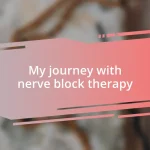Key takeaways:
- Symptom relief is a personal journey, requiring exploration of diverse methods such as natural remedies, OTC treatments, and lifestyle changes to find what works best for individuals.
- Community support and shared experiences can enhance the symptom relief process, providing valuable insights and encouragement through collective understanding.
- Mindset plays a crucial role in managing symptoms; practices like journaling can shift perspectives, fostering resilience and a proactive approach to healing.
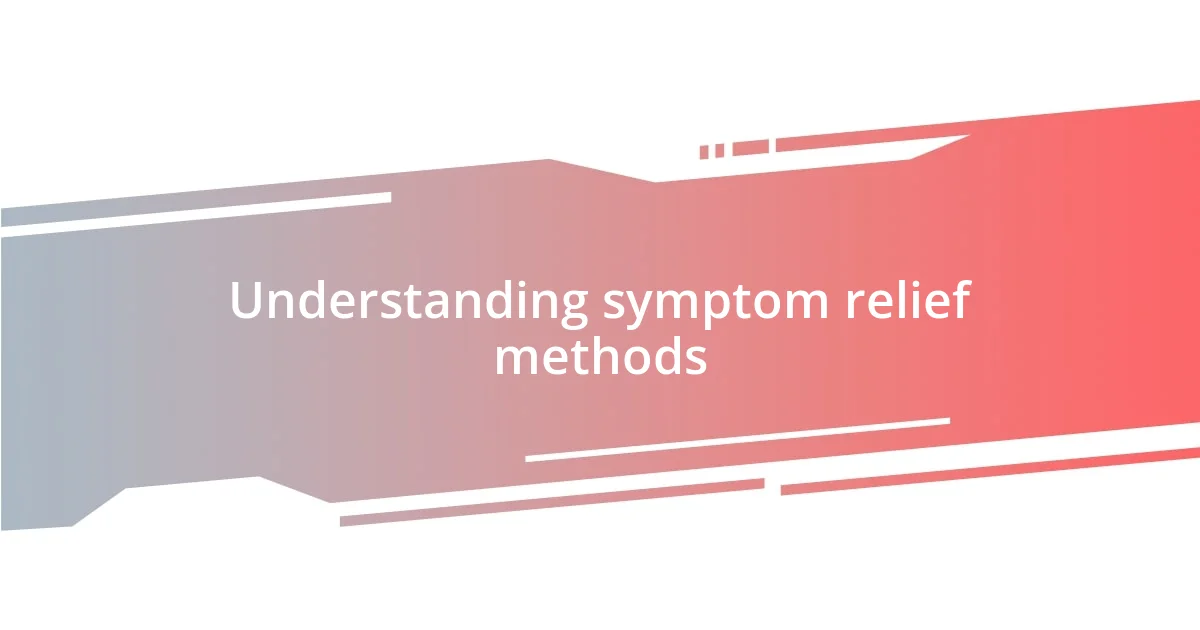
Understanding symptom relief methods
When it comes to managing symptoms, we often find ourselves navigating a vast array of methods. I remember the first time I experienced anxiety; I tried deep breathing exercises. They felt a bit silly at first, but that simple technique turned out to be a game changer when calmness seemed out of reach.
Exploring symptom relief is like piecing together a puzzle; different methods work for different people. Have you ever felt overwhelmed by choices, unsure what would actually help? I’ve been there, experimenting with everything from herbal teas to mindfulness practices. Each experience taught me something unique about myself and the importance of self-discovery in the healing process.
Ultimately, understanding symptom relief means acknowledging that it’s a highly personal journey. Sometimes it’s about finding a supportive community that resonates with your struggles. I recall a group meeting that transformed my perspective; simply sharing with others who understood made relief feel tangible and attainable. How can we tap into that shared experience to enhance our own strategies for relief?
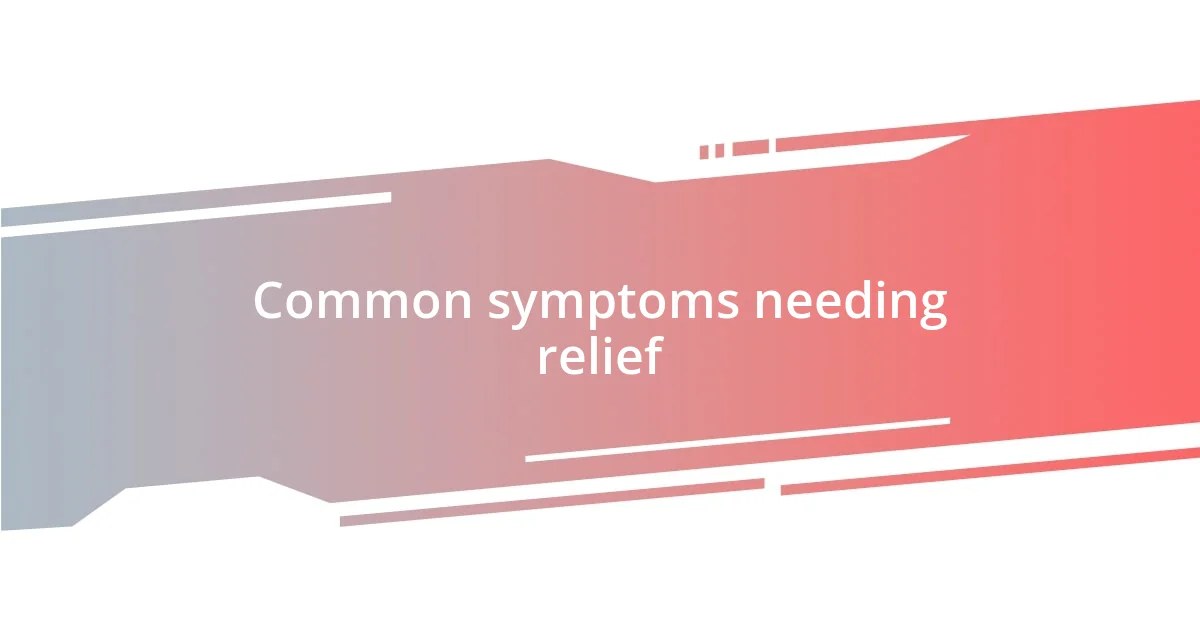
Common symptoms needing relief
Certain symptoms can significantly impact our daily lives, leading us to search for effective relief. I’ve often struggled with headaches that would creep up unexpectedly, leaving me feeling like I was trapped in a fog. Sometimes, I swear my coffee was the culprit! Identifying these feelings is critical; it helps in addressing not only the discomfort but also our overall well-being.
Here are some common symptoms people frequently seek relief for:
– Headaches: Often triggered by stress, dehydration, or poor posture.
– Anxiety: Can manifest as racing thoughts or physical tension, often feeling overwhelming.
– Fatigue: An all-encompassing tiredness that makes even simple tasks feel daunting.
– Digestive Issues: Such as bloating or discomfort, which can stem from various dietary choices.
– Muscle Pain: Resulting from strain, stress, or even prolonged sitting at a desk.
Each of these symptoms tells a story; they signal us to pay attention to our bodies. I remember grappling with persistent muscle pain after long hours of working from home. It was not just physical discomfort; it turned into a mental hurdle that nudged me to reassess my work-life balance. It’s these connections that deepen our understanding of symptom relief and the importance of listening to our bodies.
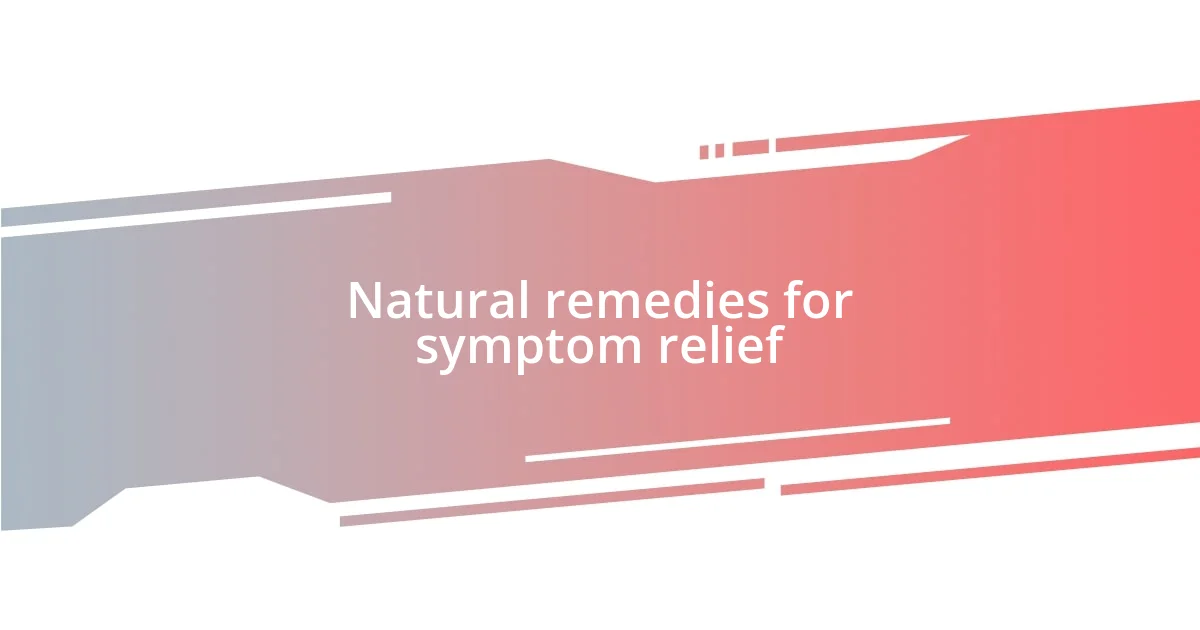
Natural remedies for symptom relief
Natural remedies can be incredibly effective for symptom relief, often providing a gentler alternative to over-the-counter medications. I remember trying essential oils on a whim for my persistent headaches. A friend suggested lavender oil for relaxation, and honestly, just inhaling that calming aroma helped me feel more grounded during those distressing moments. It’s these small, natural approaches that really resonate with me.
Herbal teas are another natural remedy I’ve turned to, particularly ginger and chamomile. When I felt bloated or uneasy, sipping on ginger tea worked wonders for digestion; it was almost as if I could feel my body thanking me. Chamomile, on the other hand, became my nighttime ritual, lulling my racing thoughts to sleep after long, stressful days. Have you ever found solace in a warm cup of tea? It’s amazing how such simple strategies can anchor us during turbulent times.
Many people also find comfort in practices like yoga and meditation as natural relief methods. I distinctly remember my first yoga class; I walked in feeling tense and left with a clarity I hadn’t experienced in ages. The gentle stretches soothed my tight muscles while the focus on breath calmed my mind, almost like hitting a reset button. These practices aren’t just about physical relief; they foster a deeper connection between mind and body, something I continually explore in my self-care journey.
| Natural Remedy | Benefits |
|---|---|
| Essential Oils | Provide calming effects and relieve tension, especially useful for headaches. |
| Herbal Teas | Aid digestion and promote relaxation, including ginger for bloating and chamomile for sleep. |
| Yoga and Meditation | Enhance mind-body connection, reduce stress, and alleviate muscle tension. |

Over-the-counter treatments overview
Over-the-counter (OTC) treatments can provide quick relief for a variety of ailments, making them a go-to option for many of us. I recall a time when a sudden headache threatened to derail my entire day, prompting a trip to the pharmacy for some ibuprofen. That moment of uncertainty—would one pill do the trick?—turned into immediate relief, showcasing how effective these medications can be when used appropriately.
In my experience, the simplicity of purchasing medications like acetaminophen or nonsteroidal anti-inflammatory drugs (NSAIDs) is incredibly appealing. They’re readily available and require no prescription, which really feels like a lifesaver during those frustrating episodes of pain or discomfort. Yet, I always remind myself to read the labels carefully. Understanding the active ingredients helps me ensure I’m making safe choices, especially when juggling multiple symptoms.
When it comes to digestive issues, I’ve come to appreciate products like simethicone and antacids. A few years ago, after indulging in a rich meal, I felt a familiar wave of discomfort washing over me. Just a couple of chewable tablets later, and I was back to enjoying my evening. Does it resonate with you? It’s moments like these that highlight how OTC treatments, while often viewed as quick fixes, can really enhance our day-to-day lives when we navigate them wisely.
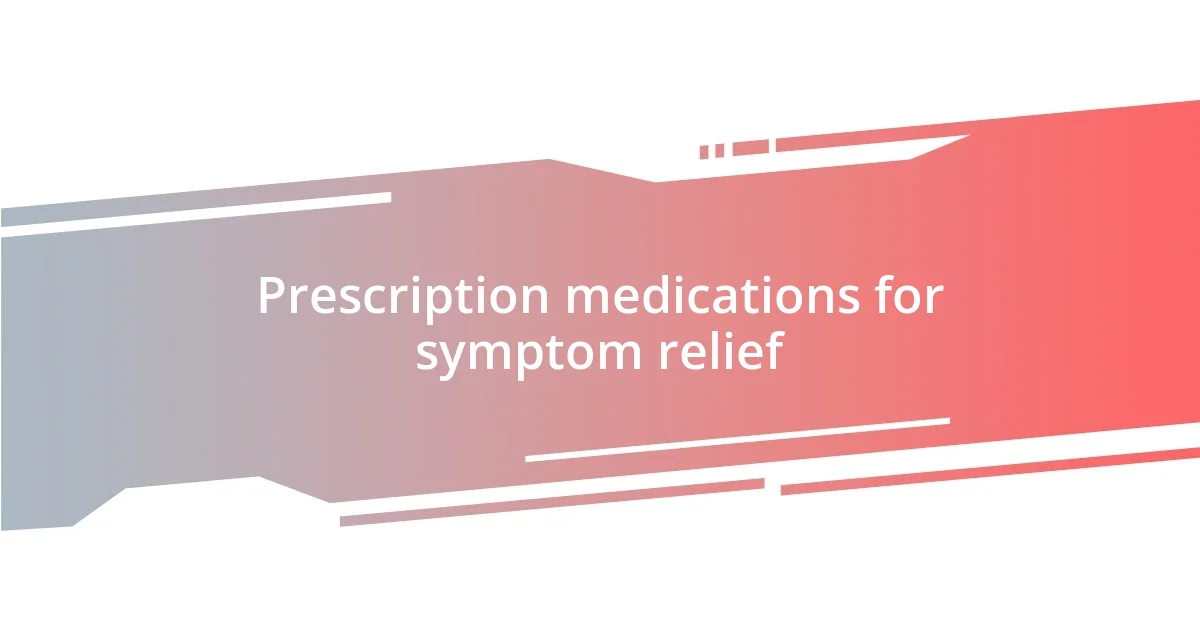
Prescription medications for symptom relief
Prescription medications can be a game-changer for symptom relief, especially when over-the-counter options don’t quite cut it. I vividly remember struggling with a persistent anxiety that left me feeling on edge daily. After discussing my symptoms with my doctor, we decided to try a low dose of an SSRI, which is a type of antidepressant that also helps with anxiety. The gradual shift in my mood helped me see a new horizon; it’s like the fog began to clear, allowing me to engage with life more fully.
When it comes to pain management, I’ve often turned to standard pain relievers prescribed by my healthcare provider, like opioids or stronger NSAIDs. I was hesitant at first, mostly due to the stigma surrounding stronger medications. However, after a recent knee surgery, I found myself needing more significant relief during recovery. Under my doctor’s watchful eye, I learned how to use these medications judiciously. It’s fascinating how having that layer of prescribed support made me feel empowered rather than dependent.
Have you ever felt like you’re juggling a million different symptoms? I certainly have. During a tough bout of migraines, my neurologist recommended a triptan medication. The first time I tried it, I held my breath, wondering if it would finally offer the respite I longed for. When I felt the pain melt away, I realized just how vital it is to have personalized medications, tailored to your specific symptoms and needs. It made me appreciate the importance of working alongside healthcare professionals to find the right solutions for us.

Lifestyle changes for symptom management
Making lifestyle changes can be pivotal in managing symptoms effectively. I remember when I decided to incorporate regular exercise into my routine; it was more than just a physical commitment—it was a complete mindset shift. Initially, I found it daunting, but as I began to enjoy yoga and long walks, I noticed my stress levels dropping and my energy levels rising. Doesn’t it feel incredible when movement transforms not just your body, but your entire day?
Dietary modifications also play a significant role in symptom relief. I’ll never forget when I cut out processed foods and refined sugars after reading about their impact on inflammation. The result wasn’t immediate, but over time, my chronic stomach issues began to ease up. It’s astonishing how selecting whole foods, rich in nutrients, made such a difference. Have you ever thought about how food fuels not just your body, but also your well-being?
Sleep hygiene is another aspect I now prioritize. When I struggled with insomnia, I had no idea how much it impacted my daily life until I made changes like establishing a consistent bedtime routine and limiting screen time before sleep. Those first nights felt like a battle, but gradually, I found myself sleeping more soundly. How often do we underestimate the power of a good night’s sleep? Embracing restorative rest became essential, and I felt like my entire outlook on life shifted for the better.

Personal experiences and lessons learned
During my journey with symptom relief, I learned the hard way that not every remedy is a one-size-fits-all. I recall vividly my experience trying various herbal supplements; each promise of relief came with its own set of challenges. I felt a mix of hope and frustration as some left me feeling jittery while others barely made a dent in my symptoms. I suppose I learned that patience is crucial—sometimes, it takes time to sift through the chaos to find what genuinely works for you.
One lesson I cherish is the value of community support. I once joined a local support group to share my experiences and listen to others. I remember the warmth of finding people who truly understood the struggles I faced. Those conversations opened my eyes to alternative methods I’d never considered. Have you ever felt like you were carrying the weight of your symptoms alone? I certainly did, but connecting with others made me realize that sharing our challenges brings solace and sometimes, even solutions.
I was surprised by how much my mental attitude shaped my experience. There was a point when I felt defeated, weighed down by the relentless nature of my symptoms. Then, I decided to shift my focus. I took up journaling, and it transformed my outlook. Writing down my feelings helped me process my frustrations and celebrate small victories. Isn’t it fascinating how our mindset can act as a bridge to achieving healing? The clarity that came from this practice showed me the importance of reflecting on my journey, allowing me to embrace every step, no matter how small.








